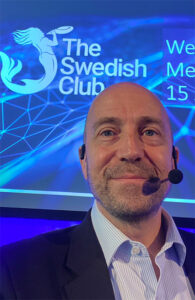Changing Course
Share this blog
Latest Maritime Vacancies
Global HR Director – Europe
Claims & Insurance Manager (Part-time) – London
Legal Counsel (Marine Operations) – London
Operational and Commercial Pricing Analyst- London
Insurance Executive – Singapore
The art of moderation


Earlier this year, Spinnaker Chairman Phil Parry was asked to moderate the AGM for P&I firm The Swedish Club – a role which Phil enjoys even though it isn’t part of his ‘day job’.
He spoke to The Swedish Club’s Triton magazine about the important role that a moderator plays at AGMs and Conferences alike.
What kind of person makes a good moderator?
“Someone who finds other people interesting, who is a listener, who doesn’t take themselves too seriously, and who can divert or interrupt a rambler!” says Phil.
The role of the moderator
We’ve all experienced boredom in a conference room, he says. The moderator’s job is to help get the audience sitting up, engaged and interested, and keep things lively, flowing and entertaining. And, while sometimes it can be challenging, the moderator should at least bring out the best in people!
“My job is to make the panellists the best version of themselves – and ensure that the audience is willing to extend generosity to the panellists. I look to make connections between people and ideas.”
A natural move
Phil has been working in the maritime industry since he left law school 30 years ago. Although he has gained quite a reputation in the industry as a moderator, he says it was never a strategic decision to take on the role. “However, I do enjoy people – particularly interesting people. Moderating sharpens the mind and I find I am much more able when under that pressure.”
Strong personalities
He has come up against strong personalities and those who take up more than their fair share of the discussion. How does he ensure everybody has their say?
“By paying attention. ‘That’s a really interesting point – what do you think, Mrs X?’ is one way to stop a time-hogger.”
Sometimes he has to navigate the balance between allowing people free speech but at the same time not letting them step out of line.
“A moderator must have the courage to intervene and disagree, or to pull in others for their opinions. Sometimes it helps to point out the potential consequences of their actions for others.”
Creating the panel
The best panels are made up of people who enjoy being on stage and have something interesting to say, says Phil. For the moderator, it’s a question of getting the audience relaxed enough to put up their hands and get involved. But then again, in Phil’s world of moderating, audience participation isn’t always voluntary.
“Once I was moderating a conference where it became clear that a speaker was about to give an almost identical speech to that of a previous speaker. I roped in the second speaker and together we asked the audience a few questions to work out who were the most interesting people in the audience. We then dragged them up on stage to make an impromptu panel including the second speaker. Thankfully it worked extremely well!”
Personal input
He says having his own opinion or detailed knowledge of a topic being discussed can be helpful. “It enables scene-setting and incisive questioning. It also helps sometimes to be able to interpret jargon for the audience’s benefit.”
Phil is proud of the fact that he once managed to concentrate enough to summarise an entire two-day conference at the IMO in under ten minutes and make it humorous. “I fancied myself as a standup comedian for about another ten minutes – until I realised that I’m not that funny!”
In addition to The Swedish Club AGM, Phil moderates Spinnaker’s annual Maritime HR Conference which takes place in London every May.
You can connect with Phil on LinkedIn or email him directly pparry@spinnaker-global.com